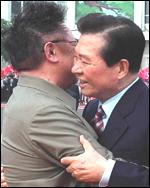
Kim Dae-jung was elected to the South Korean presidency in December 1997 promising to bring a new era to relations with North Korea.
Less than three years later he achieved what many Koreans thought was an impossibility - a summit meeting with his isolated North Korean counterpart, Kim Jong-il.
 Historic handshake: The Pyongyang summit of June 2000
|
The meeting represented the triumphant vindication of what President Kim - known popularly as "DJ" - called his "sunshine policy" towards the communist North.
Sunshine states
The June summit, bringing the two Koreas closer than they have been in 50 years, raised the hopes of Koreans on either side of the divided peninsula that a lasting peace between the last two Cold War foes could, finally, be achieved.
In the months that followed the pace of events set in train by the historic meeting has, if anything, accelerated.
 A sight few Koreans on either side thought they would ever see
|
Moves have also been made to restore transport links between the two countries - bridging the barbed wire, tank traps and landmines that line one of the most heavily fortified border zones in the world.
For its part the secretive North Korean state has begun reaching out to the rest of the world, building new diplomatic ties and developing its relationship with its one-time arch enemy, the United States.
Thawing relations
A sign of the rapid thaw in relations on that front came with the surprise announcement that US Secretary of State, Madeleine Albright, would be making an unprecedented visit to Pyongyang.
 The pain of division is acute for thousands of Korean families
|
During his first year in office Pyongyang tested his tolerance on a number of occasions.
Territorial incursions by North Korean submarines and the testing of a new ballistic missile raised the stakes in a dangerous game of brinkmanship.
As a result, domestic critics of his sunshine policy became increasingly vocal.
Undeterred President Kim stuck by his line that engagement with the North was the only way forward.
Battling dictatorship
That determination was born of Mr Kim's often turbulent year's as a political dissident, campaigning for democracy against South Korea's hardline military dictatorship.
 Years as a pro-democracy dissident earned him the nickname of "Asia's Mandela"
|
In 1973, two years after losing his first run for the presidency against military strongman Park Chung-hee, he was kidnapped from a Tokyo hotel room.
Mr Kim later identified his kidnappers as South Korean agents saying they had bundled him on board a boat and tied him to a traditional Korean burial board weighed down with concrete weights.
According to Mr Kim, his life was saved by the sudden unexplained appearance overhead of a US military helicopter.
Rebuild bridges
He remained a tireless campaigner for democracy in South Korea and in 1997, with the country reeling under impact of Asia's economic crisis, he won a razor-thin majority in the presidential elections.
 The Korean border is one of the last frontiers of the Cold War
|
At his inauguration ceremony on a cold February morning in 1998 he told South Koreans it was time to rebuild bridges to their fellow Koreans in the North.
"Our people are quite homogeneous," he said in a BBC interview at the time. "Our unification lasted for 1,300 years so there is no reason for us not to work towards unification again."
The decision to award President Kim the first Nobel Peace Prize of the new century is testament to that resolve.
| Search BBC News Online |
||
Advanced search options | ||
|
| |
|
| |
|
|
|
Inside North Korea
|
|
Divided peninsula
|
The BBC is not responsible for the content of external internet sites

~RS~a~RS~international~RS~q~RS~~RS~z~RS~14~RS~)